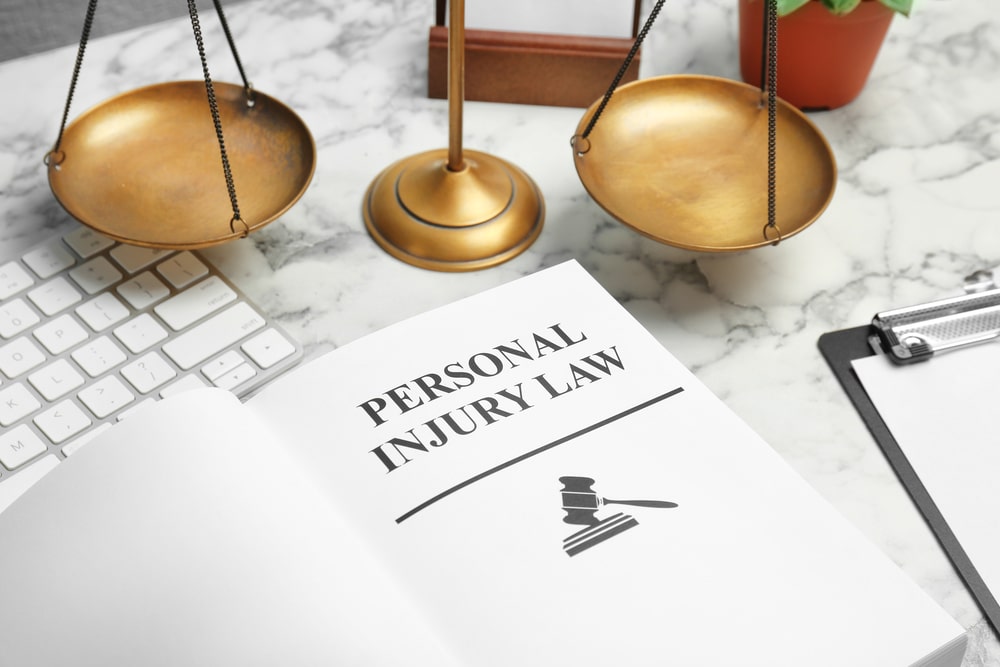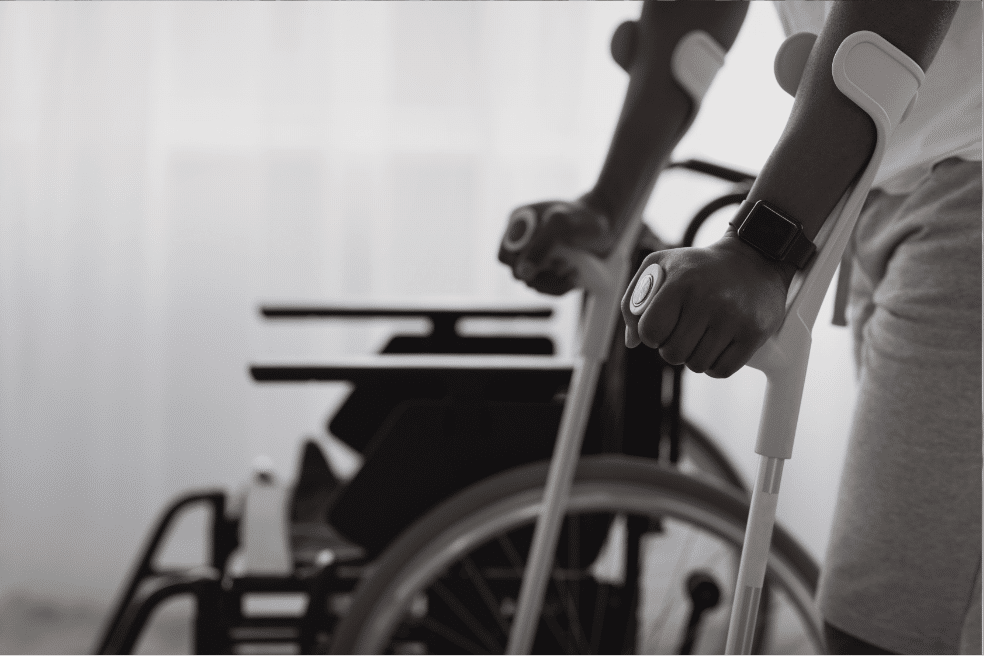What to expect from the personal injury claims process
- What to expect from the personal injury claims process
- What to do as soon as possible (even before filing your personal injury claim)
- Claiming first-party benefits
- Claiming third-party benefits
- A quick walkthrough of the personal injury claims process
- Why hire an experienced personal injury lawyer?
- Level the playing field by calling the Zach Herschensohn team
If you sustained an injury due to someone else’s negligence, you’re likely looking for answers—particularly if that same injury is causing medical bills to pile up, keeping you from working, and interfering with your ability to enjoy daily life.
Want to know one place you probably won’t get those answers? The at-fault party’s insurance company.
They will put their own interests ahead of your needs and may even try to change the story to cover their tracks. These factors—and more—make pursuing a personal injury claim complicated and frustrating, especially if you try to go it alone.
The good news is this: you have legal options. If someone else was responsible for your injuries, you can and should seek compensation. But a lot must happen before you finally get that check in your hands, and it’s important to be patient and know what to expect when pursuing a personal injury claim.
In this blog, we’ll take a closer look at what you can expect from claims process in a typical personal injury case.
RELATED POST: 4 Important questions to ask a potential personal injury lawyer
You don’t want to wait too long after your injury before filing your claim, but there are a few key steps you don’t want to neglect if you can help it.
- Gather as much evidence as you can. Granted, if you’re reading this post, you probably aren’t still at the accident scene. But if you are, make sure to take pictures and get contact info from witnesses. And if you aren’t, take the time to write down what you remember in as much detail as you can.
- Seek medical treatment. Do this even if you feel like your symptoms aren’t all that serious. For one, sometimes serious injuries don’t fully reveal themselves for a few days or even a few weeks after the incident. Two, it helps you to unambiguously demonstrate that your injuries are related to the accident. (Insurers will try to imply that delays in treatment are evidence that your injuries weren’t really that bad, or that you’re making them up.)
- Hire a personal injury attorney. Trust us on this one—the sooner you contact a lawyer, the more they can typically do to help you. Right off the bat, the insurance claims adjuster is going to be looking for ways to dispute your damage claims, or even get you to say things that will unintentionally damage your case. They are not your friend and having a lawyer protecting you from the very beginning of the claims process helps you defend your rights.
“Very knowledgeable and trustworthy. Zach Herschensohn provided me with excellent service. He kept me well informed and explained complicated issues in a way I could understand. He took the lead and guided me through everything necessary to achieve a successful outcome. Overall, I am very pleased with his service and would highly recommend him to anyone.”
“Very knowledgeable and trustworthy. Zach Herschensohn provided me with excellent service. He kept me well informed and explained complicated issues in a way I could understand. He took the lead and guided me through everything necessary to achieve a successful outcome. Overall, I am very pleased with his service and would highly recommend him to anyone.”
“Very knowledgeable and trustworthy. Zach Herschensohn provided me with excellent service. He kept me well informed and explained complicated issues in a way I could understand. He took the lead and guided me through everything necessary to achieve a successful outcome. Overall, I am very pleased with his service and would highly recommend him to anyone.”
“Very knowledgeable and trustworthy. Zach Herschensohn provided me with excellent service. He kept me well informed and explained complicated issues in a way I could understand. He took the lead and guided me through everything necessary to achieve a successful outcome. Overall, I am very pleased with his service and would highly recommend him to anyone.”
“Very knowledgeable and trustworthy. Zach Herschensohn provided me with excellent service. He kept me well informed and explained complicated issues in a way I could understand. He took the lead and guided me through everything necessary to achieve a successful outcome. Overall, I am very pleased with his service and would highly recommend him to anyone.”
When pursuing first-party benefits, you don’t file a claim against the at-fault party’s insurance company. Rather, you file for no-fault benefits with your own insurance company. Most first-party benefits are paid from your personal injury protection (PIP) insurance policy. Under Washington law (Section 48.22.085), your car insurance provider must offer you PIP.
Whether or not you want PIP coverage is your choice. If you choose not to purchase PIP coverage, you must notify your insurance provider in writing. Otherwise, your insurance company will automatically add it to your policy.
We strongly recommend that you purchase PIP in case you sustain an injury during a crash. You won’t have to prove the negligence of another party but getting benefits from your own insurance company can still be difficult. Attorney Zach Herschensohn can help you with that.
What first-party benefits cover:
- Medical expenses: A comprehensive PIP policy pays for up to $10,000 in reasonable and necessary medical treatment costs. If you purchase additional coverage, you can receive up to $35,000 for medical expenses.
- Wage loss: PIP pays for up to $200 per week in wage reimbursement for up to one year if you’re unable to work due to your injuries. You must have been out of work for at least 14 consecutive days after your crash to be eligible. If you purchase additional coverage, you can receive up to $700 per week. PIP pays for wage reimbursement for up to one year from the date of your crash.
- Home assistance: If you’re unable to perform daily tasks at home due to your injuries, you’re likely eligible for home assistance. PIP pays up to $200 per week for assistance from a non-family member. Comprehensive PIP policies have a limit of $5,000 for home assistance. You have the option to purchase additional coverage to increase the limit to $14,600.
- Funeral expenses: PIP pays up to $2,000 for each person killed in a crash to the closest surviving family members.
Third-party benefits apply to injured parties whose damages exceed the PIP limit. When you pursue a third-party claim, you file a claim against the at-fault party’s insurance company. Third-party benefits pay for:
- Cost of current and future medical care
- Lost wages
- Home assistance
- Non-economic damages, such as pain and suffering, mental anguish and loss of enjoyment of life
- Death benefits to the family of the victim if the injuries are fatal
- Damage to property or loss of property
Unlike first-party claims, third-party claims are fault-based. That means you must prove that someone else’s negligence caused your injury.
Third-party benefits are paid when your lawyer and the insurer agree on a fair settlement. Most personal injury cases are resolved through settlements. Sometimes, an agreement can’t be reached, or the insurance company acts in bad faith. This is when your case will go to trial. Both your lawyer and the insurance company will present their arguments and evidence they have gathered. Should your case go to trial, you will only be compensated if a verdict can be reached.
Connecting your injuries to negligence
Negligence occurs when an individual fails to use caution or acts in a reckless manner when any reasonable person would have used caution in the same situation. For instance, any reasonable person would avoid texting and driving. The driver who causes a crash while texting and driving acts in a negligent manner.
When litigating your case, it will take solid evidence to connect your injuries to someone else’s negligence. In most cases, some tactics your lawyer will use to gather evidence includes:
- Reviewing police reports or incident reports
- Surveying the scene where the incident occurred
- Checking video footage from nearby surveillance cameras
- Interviewing witnesses and cross-referencing their statements with other evidence
- Getting a copy of your medical records
So now that you know a little bit more about the types of claims you may be eligible to make, let’s break down the actual personal injury claim process into the basic steps.
You and your lawyer investigate the case
As mentioned above, you’ll need to have solid evidence to support your claim that the other party (or parties) were responsible for your injuries. But you’ll also need to accurately calculate how much you’re entitled to receive in financial compensation. Even if the insurance company agrees that their driver was 100% at fault, they’ll still probably try to get you to take less than you deserve. And if you settle, you can’t go back for more later.
Your lawyer will leave no stone unturned when determining the value of your claim. No two personal injury claims are alike, so determining how much compensation you’re eligible for will take some time. These are the factors that will determine the value of your claim:
- Your current and future medical expenses
- An estimate of how long it will take for you to recover
- Your loss of wages or earning capacity
- The amount of physical pain, suffering and mental anguish you endured
- If you will need home assistance, vocational rehabilitation or other long-term assistance
- Punitive damages (this only applies to recklessness or malicious behavior)
You attempt to negotiate a settlement
Once a full investigation has taken place and you’re armed with all your evidence, you’ll make your demand letter for compensation. (You should also wait until you’ve made your maximum medical improvement after the injury. Otherwise, you run the risk of significantly underestimating your future medical bills.)
Very frequently, the insurer isn’t going to agree to your initial offer—just like you generally shouldn’t agree to theirs. But if both sides can’t reach a middle ground that’s fair, it’s time to get the court involved.
You file a personal injury lawsuit
Filing a lawsuit doesn’t necessarily mean that your case is going to trial. Both sides can continue to negotiate pretty much right up to the court date, and most of the time they do manage to reach an agreement. (Trials are risky for everyone involved, so both sides are usually highly motivated to avoid them.)
But by filing a lawsuit, you show the insurer that you’re willing to go to the mat to get what you rightly deserve. And you also start a formal process with defined set of legal steps that will ultimately end in a resolution—one way or another.
There will be what’s known as a discovery process, in which attorneys from both sides will investigate each other’s evidence and legal arguments. You may be asked to give a deposition or answer a series of questions.
Once everybody’s cards are on the table, it’s usually easier to hash out a fair settlement—sometimes with the use of independent mediator helping things along. But if the sides still can’t agree, the case will go to trial.
The at-fault party’s insurance company is going to start building a case against you from the get-go. They have no interest in compensating you and will do everything in their power to downplay your claim. Their goal is to close your case out as cheaply as possible, and if they don’t have a strong basis to deny your claim, they’ll likely throw out a quick lowball settlement, then try to drag the process out as long as possible if you don’t take it.
Seeking legal advice from personal injury attorney as soon as possible is one of the best ways you can protect yourself from these dirty tricks. A great attorney will steer you clear of the traps insurer’s set to sabotage your case. They will also have the experience, training, and connections to help you sort through the evidence, establish proof of the other party’s negligence, and make sure you claim every last cent of damages that you’re entitled to receive.
Injured people in Washington put their trust in Attorney Zach Herschensohn because he never stops fighting for the best possible outcome. He has fought to recover millions of dollars in damages for his clients and has the case results to prove it.
RELATED RESOURCE: Top Case Results
If you’ve been injured, there is simply too much at stake to risk handling the case on your own. Get experience on your side. Set up your free and confidential legal consultation with Herschensohn Law Firm, PLLC to learn about your legal options. We serve injured people in Kent and throughout the greater Seattle Metro area. Contact us online or call us today.
The content provided here is for informational purposes only and should not be construed as legal advice on any subject.
Our results speak for themselves
After a worker was electrocuted on a construction site and suffered life-changing injuries, we fought and won on their behalf.
When a retired man was killed in a truck accident, we made sure his grieving family got fair compensation.
When a defective medical device harmed our client, we fought to ensure they had the financial compensation needed to recover.
Hurt? Let our law firm handle the details
When you request your free consultation, Kent personal injury attorney Zach Herschensohn will listen to you, answer your questions, lay out your legal options, and give you down-to-earth legal advice.
When you work with our law office, there are no obligations, hidden fees, or fine print. It’s that simple.








